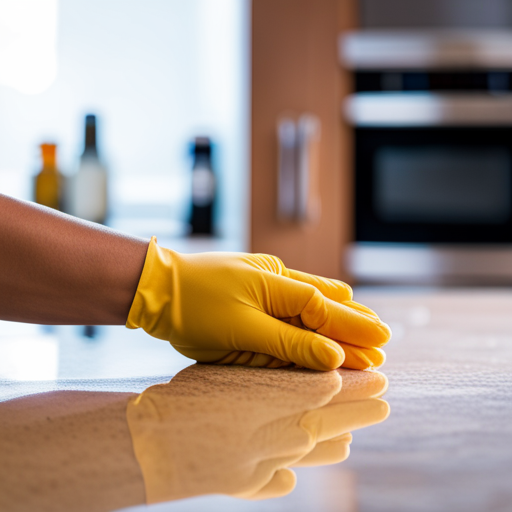Are you frustrated with hard water stains on your beautiful granite countertops? Do those unsightly marks and spots make you cringe every time you walk into your kitchen? Well, fear not! There are solutions to this annoying problem, and we’re here to help you find them.
First, let’s start by understanding what hard water is. It’s water that contains high levels of minerals like calcium and magnesium, which can leave stains and spots on your granite surface.
But don’t worry, there are steps you can take to prevent these stains and keep your granite looking beautiful for years to come. And if you already have hard water stains on your granite, don’t fret, because we have solutions for removing them too.
So, let’s dive in and learn how to say goodbye to hard water stains on your beloved granite countertops!
Key Takeaways
– Hard water can leave unattractive marks and spots on granite countertops.
– Keeping granite dry and cleaning up after doing dishes can prevent hard water stains.
– A mix of baking soda and water can remove hard water stains on granite, but harsh scrubbing should be avoided.
– Harsh cleaning agents, including bleach and CLR, should be avoided on granite to prevent damage.
Understanding Hard Water
If you have hard water, you may notice marks and spots on your granite countertops due to high mineral deposits like calcium and magnesium. These mineral deposits are common in tap water and can leave behind a white, unattractive film on your granite.
To minimize mineral deposits, it’s important to keep your granite dry. Make sure to clean up after doing dishes or scrubbing pots and pans to prevent hard water stains from forming.
One of the best ways to prevent hard water stains on granite countertops is to use a point-of-entry water softener device. This device can eliminate hard water stains at the source, ensuring that your granite stays looking beautiful for years to come.
By investing in a water softener, you can enjoy the benefits of granite countertops without having to worry about unsightly stains or damage caused by hard water.
Preventing Stains on Granite
To prevent unsightly marks on your beautiful granite countertops, always make sure to wipe up any spills or moisture immediately. This can be done with a soft cloth or absorbent microfiber towel.
It’s also important to dry dishes and glasses on top of a soft surface or mat, rather than directly on the granite surface. This can prevent water spots and hard water stains from forming on your countertops.
Another way to prevent hard water stains on granite is to invest in granite sealing. Sealing your granite countertops can offer good protection from moisture and stains, as it creates a barrier between the granite and any liquids that come into contact with it. Sealing should be done every year or two, depending on usage.
By taking these steps, you can keep your granite countertops looking beautiful and free from hard water stains.
Removing Hard Water Stains
You can easily remove those pesky marks and spots on your countertops caused by mineral buildup in your tap water with a simple mixture of baking soda and water. Simply mix a small amount of baking soda with water to create a paste, then use a soft cloth to gently scrub the affected area.
Rinse the area with water and dry with a soft towel. This natural solution is safe for your granite countertops and can be done at home without the need for professional cleaning services.
While home remedies like baking soda and water can be effective in removing hard water stains on granite, some homeowners prefer to use chemical solutions or seek professional cleaning services for tougher stains.
Chemical solutions like vinegar or lemon juice can actually damage the sealant on your granite countertops and should be avoided. If you have stubborn stains that won’t come out with a DIY approach, it’s best to hire a professional cleaning service that specializes in granite.
They can use specialized equipment and solutions to effectively remove hard water stains and restore your granite countertops to their original beauty.
Maintaining and Protecting Granite
Maintaining the beauty and durability of your granite countertops is crucial in ensuring their longevity and resistance to damage. Aside from regular cleaning, it’s also important to have the right sealing techniques to protect your granite from common damages.
Sealing your granite countertops can offer good protection from moisture and stains. However, it’s important to note that the lighter colored granite is, the worse it will look when stained. Turmeric powder, for instance, can ruin countertops even if sealed.
Aside from sealing, it’s also important to avoid using harsh cleansers like Comet and CLR, which can cause serious damage to granite and granite seals. Instead, use neutral pH level granite cleaners and avoid harsh scrubbing materials like steel wool.
Dishes and glasses should also be allowed to dry on top of a soft surface or mat, not directly on the granite surface. By following these tips, you can maintain the beauty and durability of your granite countertops for years to come.
Conclusion
So there you have it, a comprehensive guide on how to deal with hard water stains on your granite countertops.
Remember, prevention is key, so make sure to use a high-quality sealer and avoid using harsh chemicals or abrasive materials on your granite.
If you do end up with hard water stains, don’t panic – there are plenty of effective solutions, from using vinegar and baking soda to commercial granite cleaners.
Just be sure to test any products on a small, inconspicuous area first to ensure they won’t damage your stone.
And once your countertops are clean and stain-free, don’t forget to maintain them regularly to keep them looking their best for years to come.
With a little effort and care, your granite countertops will continue to be a beautiful and durable feature in your home.
